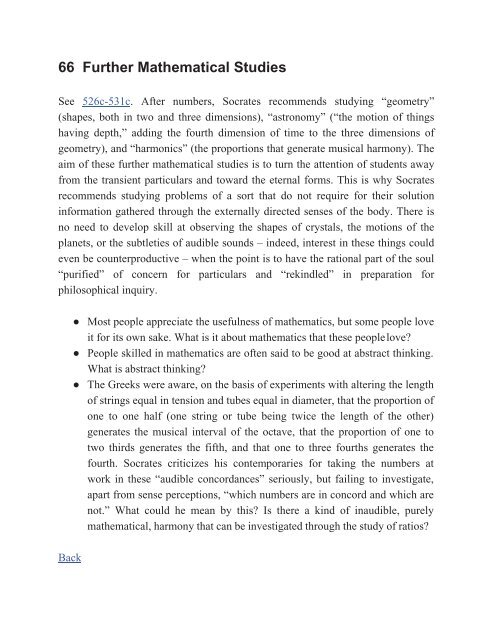The Intelligent Troglodyte’s Guide to Plato’s Republic, 2016a
The Intelligent Troglodyte’s Guide to Plato’s Republic, 2016a
The Intelligent Troglodyte’s Guide to Plato’s Republic, 2016a
You also want an ePaper? Increase the reach of your titles
YUMPU automatically turns print PDFs into web optimized ePapers that Google loves.
66 Further Mathematical Studies<br />
See 526c-531c. After numbers, Socrates recommends studying “geometry”<br />
(shapes, both in two and three dimensions), “astronomy” (“the motion of things<br />
having depth,” adding the fourth dimension of time <strong>to</strong> the three dimensions of<br />
geometry), and “harmonics” (the proportions that generate musical harmony). <strong>The</strong><br />
aim of these further mathematical studies is <strong>to</strong> turn the attention of students away<br />
from the transient particulars and <strong>to</strong>ward the eternal forms. This is why Socrates<br />
recommends studying problems of a sort that do not require for their solution<br />
information gathered through the externally directed senses of the body. <strong>The</strong>re is<br />
no need <strong>to</strong> develop skill at observing the shapes of crystals, the motions of the<br />
planets, or the subtleties of audible sounds – indeed, interest in these things could<br />
even be counterproductive – when the point is <strong>to</strong> have the rational part of the soul<br />
“purified” of concern for particulars and “rekindled” in preparation for<br />
philosophical inquiry.<br />
Most people appreciate the usefulness of mathematics, but some people love<br />
it for its own sake. What is it about mathematics that these people love?<br />
People skilled in mathematics are often said <strong>to</strong> be good at abstract thinking.<br />
What is abstract thinking?<br />
<strong>The</strong> Greeks were aware, on the basis of experiments with altering the length<br />
of strings equal in tension and tubes equal in diameter, that the proportion of<br />
one <strong>to</strong> one half (one string or tube being twice the length of the other)<br />
generates the musical interval of the octave, that the proportion of one <strong>to</strong><br />
two thirds generates the fifth, and that one <strong>to</strong> three fourths generates the<br />
fourth. Socrates criticizes his contemporaries for taking the numbers at<br />
work in these “audible concordances” seriously, but failing <strong>to</strong> investigate,<br />
apart from sense perceptions, “which numbers are in concord and which are<br />
not.” What could he mean by this? Is there a kind of inaudible, purely<br />
mathematical, harmony that can be investigated through the study of ratios?<br />
Back


















